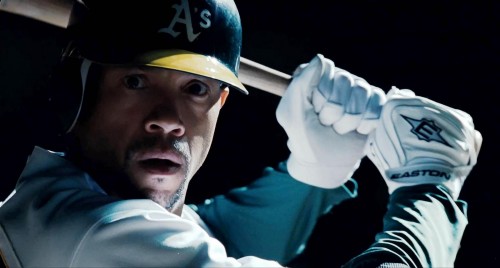To cater to different types of readers, we offer Moneyball reviews of three lengths: 700 words for the procrastinators, 70 words for the busy, and 7 words for the ADD-afflicted.
 7-Word Review for the ADD-Afflicted:
7-Word Review for the ADD-Afflicted:
Unfolds like a baseball game: oddly graceful.
70-Word Review for the Busy:
If you’re like me, but you cry more easily, then Moneyball will make you cry. Granted: it’s slow. Granted: it’s about baseball statistics. Granted: the closest thing to a love story is Jonah Hill’s apprenticeship with Brad Pitt. But Pitt’s portrayal of Billy Beane – failed major league player and frustrated general manager, a man who can’t win and who can’t bear to lose – is worth the price of the ticket.
700-Word Review for the Procrastinators:
Moneyball is paced a little like baseball itself: slow and erratic.
Tension builds, then dissipates, then builds again. It’s studded with dry spells and hot streaks and anticlimaxes – the rhythm not only of baseball games, but of whole seasons and careers, too. And like baseball, Moneyball rewards the patient, knowledgeable viewer – not so much the casual fan. But just as I’ll defend the sport itself, I’m willing to stand up for Moneyball. The film is a well-drawn character portrait of A’s general manager Billy Beane, a man who can’t win and can’t bear to lose.
First of all: Why the funny pacing? Because the film cleaves closely (perhaps too closely) to reality.  The screenplay takes some liberties – e.g., pretending that Billy Beane hadn’t caught wind of this whole “statistics†craze until early 2002 – but only some. David Justice is real. Scott Hatteberg is real. The 20-game win streak, the loss of Giambi and Damon, the Red Sox later adopting Billy Beane’s basic model – all real. “Everyday Eddie†Guardado (seen on the mound for the Twins towards the end) is way fatter in real life; Jonah Hill’s counterpart (who declined to let his actual name be used in the film) is way thinner. But both exist. Billy Beane really does have a daughter, although her finest moment in the film involves a song that would not be written for another five years.
Because the film cleaves closely (perhaps too closely) to reality.  The screenplay takes some liberties – e.g., pretending that Billy Beane hadn’t caught wind of this whole “statistics†craze until early 2002 – but only some. David Justice is real. Scott Hatteberg is real. The 20-game win streak, the loss of Giambi and Damon, the Red Sox later adopting Billy Beane’s basic model – all real. “Everyday Eddie†Guardado (seen on the mound for the Twins towards the end) is way fatter in real life; Jonah Hill’s counterpart (who declined to let his actual name be used in the film) is way thinner. But both exist. Billy Beane really does have a daughter, although her finest moment in the film involves a song that would not be written for another five years.
So, flawless realism? No. But pretty darn close, for Hollywood.
The puzzle for the filmmakers, of course, is how to craft compelling visuals out of baseball statistics. (Getting compelling visuals out of baseball itself can be challenge enough.) They try their best: Quiet music plays as we pan across tables of numbers. Players swing bats and throw balls in isolation, with the background washed to black – a visual imitation of the clarity that statistics offer. Aaron Sorkin’s dialogue helps, though the screenplay doesn’t quite have the sizzle of The Social Network.
But in the end, Moneyball is compelling for the same reason that baseball is compelling: the characters. The lineup, if you’ll indulge the metaphor.
Batting leadoff: Jonah Hill, who gives compelling proof that he can dial back the Superbad-style profanity and portray an actual character (in a way that, say, Seth Rogen has never portrayed anyone other than Seth Rogen). Batting second: Chris Pratt (of TV’s excellent Parks and Recreation), who will steal your heart in brief screen time as converted first baseman Scott Hatteberg. Batting third: Philip Seymour Hoffman, master of the malcontented slouch, who brings his surly best (and a shaved head) to his role as A’s manager Art Howe.
But they’re all just setting the table for the cleanup hitter: Brad Pitt.

